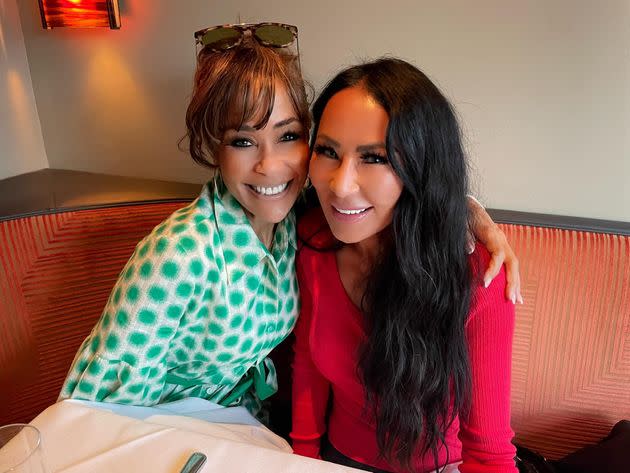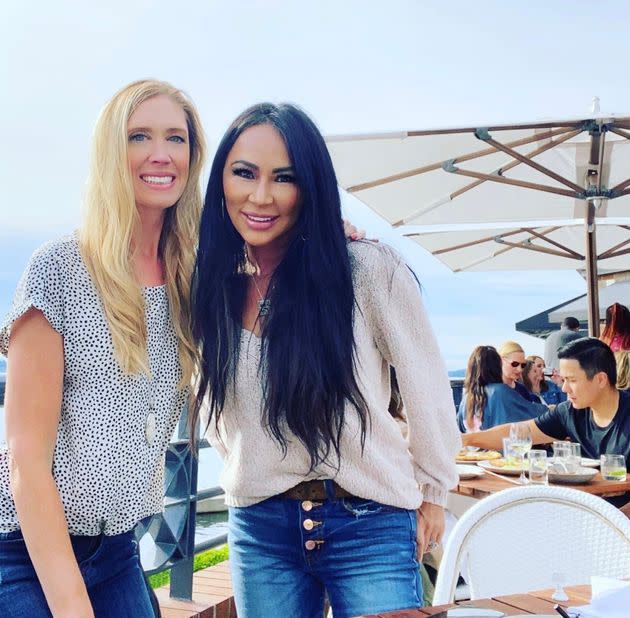I Interviewed 144 Of My Girlfriends About Our Friendships, And What I Found Changed My Life

Shari and her friend Dana.
Three of my life experiences — a cancer diagnosis, attending a friend’s memorial service and embarking on my last year of my fourth decade — were the combined catalyst of a three-year journey that led me to ask 144 of my girlfriends to share a meal, coffee, cocktail or even a Zoom date simply for the purpose of talking about our friendship and to ask them questions that I never asked before about their lives.
When I share this journey, the first question I’m often asked is, “How do you have 144 friends?” followed by, “I can only come up with maybe 10 or so friends that I’d even consider sitting down with to have these types of conversations.” My response is simply, “My friendship bar is low.”
I don’t mean that the quality of friends I have is poor. Instead, I’m referring to the ease in which friendships come to me. In part, developing friendships is easy for me because instead of seeing people as strangers, I see them as friends I have not met yet. This mindset allows me to interact with anyone as if they are a friend from the moment I meet them.
An example of meeting friends everywhere I go happened just this October. I solo traveled from Seattle to New York City to attend a workshop. After a long day of meeting after meeting, I returned to my hotel and ventured down to the hotel bar for dinner. I was famished and sat at the bar counter. I ordered a large crispy duck salad and a hefty round loaf of focaccia bread.
The woman seated next to me at the bar, who was a New Yorker, had just gotten off work. She commented that the bread looked and smelled amazing, and I proceeded to offer her the bread that I had not yet touched, as if we were good friends sitting next to one another at a planned night out. She and I literally broke bread together that evening.
If someone were to have approached us, I would have without hesitation introduced her as “my friend Alex.”
The 144 girlfriends I spoke with for my three-year project range in age from their 20s to their 70s, come from different racial and ethnic backgrounds, have completed different levels of education, believe across the spectrum regarding politics and religion and come from a range of economic classes. And the differences don’t stop there.
These differences are those that at face value would seem to separate us, but what I soon found was the similarities and connections among my girlfriends far outweigh any perceived differences. Each of these girlfriends has taught me something about female friendships and life in general.
Through this process, what surprised me the most are the things that I learned about my friends, even those that I consider my lifelong friends, including pivotal life experiences that they had never shared with me before.
For example, I have a friend who I have known for a little over a decade who shared with me that she has struggled with daily anxiety and depression since her teenage years. She literally talks herself out of bed each morning.
Before our conversation that day, I had thought of this friend as someone who was unreliable because of her history of canceling dates, but I now see her as one of my strongest friends. I think back to the times when she made it to a social gathering, and I am inspired by the strength that it must have taken her to prepare mentally and emotionally to show up as she did.

Shari with her friend Rebecca.
Another one of the 144 conversations that changed my life was with a former co-worker. During our meeting, she shared that her son, whom I had met when he was a young child, had been on and off the streets for much of the past decade due to drug and alcohol addiction.
Fortunately, at the time we spoke, he was doing extremely well. He was holding down a job and, with several support systems in place, he was working hard to stay clean and sober. Having this conversation with her and seeing the pain on her face as she described her family’s experience made me realize that I had stopped looking at the homeless in my city as someone’s family member, as a person deserving of love. Because of our conversation, I now carry backpacks in my car filled with toiletries, socks, gloves and other supplies.
It did not take me long to realize that these intentional dates with friends were literally changing the way I moved through my daily life.
Though these dates started out as a personal project, they became memorialized in a book series known as theFriendship series. Inspired by what I had learned during my first year of meeting girlfriends, during my second year of dates, which is captured in the second book of the series, “Make Your Mess Your Message,” I decided to ask the question, “What is the mess that became your message?” I was moved by their private struggles — that some of my girlfriends are still dealing with to this day.
These intentional conversations with my friends brought a new understanding of who each of them is on a deeper level. My experience also made me wonder, “What are the effects of hiding our struggles from our friends? And can I do better?”
I remember feeling betrayed and hurt when I learned that a good friend hid a part of herself from me. In this case, she hid her separation from her spouse. My feelings of betrayal came from a sense that I was being judged as someone who could not be trusted. It felt like a punch to the gut, and it made me feel like my friendship was not as solid as I thought it was, especially since I had shared my personal ups and downs with her throughout our years of friendship.
I now realize, following my experience of these 144 dates with my friends, my feelings of hurt and betrayal were misplaced. My girlfriend was raised in a home where appearance was everything, and she never learned how to share the messy parts of her life.
While social media has caused us to be rightfully cautious of airing our dirty laundry online, it has unfortunately also made us even more cautious of what we share with our friends in real life. The COVID-19 pandemic has added to this because, during the height of the pandemic, we not only had to define who we felt safe with in our physical bubble but also who we trusted with our opinions and our emotions.
Through my experience of sitting down with my friends and getting to know them on a deeper level, I’ve learned to be more open with all friends and not just those that I consider to be very close. I’m no longer held back by the fear of judgment because what I’ve come to realize is that we all have messy lives.
I’ve learned that by embracing and becoming comfortable with talking about some of the more difficult pieces of my life, the conversations that followed deepened my friendships and my connection to others. I’ve found that friends trust me more when they see that I accept the parts of me that could be perceived as flaws.
And once I began to love the things that make me unique, even greater opportunities for new friendships began to unfold.
Do you have a compelling personal story you’d like to see published on HuffPost? Find out what we’re looking for here and send us a pitch.

